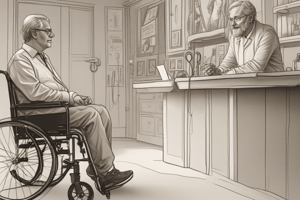Podcast
Questions and Answers
Why do some parents with disabilities rely on informal caregiving for assistance?
Why do some parents with disabilities rely on informal caregiving for assistance?
- All disabled parents have access to essential training.
- Formal care options are always more expensive.
- They often prefer the familiarity of family help. (correct)
- There is a lack of available formal services. (correct)
What is one suggested solution for helping disabled parents cope with their responsibilities?
What is one suggested solution for helping disabled parents cope with their responsibilities?
- Establishing more daycare services for disabled children. (correct)
- Encouraging complete independence from family support.
- Focusing solely on individual therapy for disabled parents.
- Reducing the number of disability benefits available.
What are common barriers faced by disabled persons in accessing higher education and employment?
What are common barriers faced by disabled persons in accessing higher education and employment?
- Increased availability of adaptive technologies.
- Excessive peer competition in college environments.
- Limited support and resources tailored to their needs. (correct)
- High academic standards that are easy to meet.
What role do negative social attitudes play in the violence against disabled individuals?
What role do negative social attitudes play in the violence against disabled individuals?
What issue is highlighted as intersecting with women who have disabilities?
What issue is highlighted as intersecting with women who have disabilities?
What does the social model of disability primarily focus on?
What does the social model of disability primarily focus on?
Why are girls often diagnosed with disabilities later than boys?
Why are girls often diagnosed with disabilities later than boys?
Which factor can significantly impact how families organize work and family life when they have a child with a disability?
Which factor can significantly impact how families organize work and family life when they have a child with a disability?
What is one of the primary reasons that prevent parents of disabled school-aged children from getting necessary assistance?
What is one of the primary reasons that prevent parents of disabled school-aged children from getting necessary assistance?
What is a common misconception about women in wheelchairs regarding their ability to parent?
What is a common misconception about women in wheelchairs regarding their ability to parent?
What role does familialism play in the parenting abilities of disabled mothers?
What role does familialism play in the parenting abilities of disabled mothers?
What percentage of Canadians aged 15 and older reported one or more disabilities in 2022 according to the Canadian Survey on Disability?
What percentage of Canadians aged 15 and older reported one or more disabilities in 2022 according to the Canadian Survey on Disability?
Which of the following reflects the debate on disability and poverty?
Which of the following reflects the debate on disability and poverty?
Which of the following is NOT identified as a main reason for disability in Canada?
Which of the following is NOT identified as a main reason for disability in Canada?
What is often highlighted as a need for families with a disabled child?
What is often highlighted as a need for families with a disabled child?
What is the disability rate among seniors aged 65 and over compared to children aged 14 and under?
What is the disability rate among seniors aged 65 and over compared to children aged 14 and under?
How does the Social Model of Disability contrast with the biomedical model?
How does the Social Model of Disability contrast with the biomedical model?
What factors are considered when examining the lives of disabled individuals?
What factors are considered when examining the lives of disabled individuals?
What is a challenge in defining disability according to the Canadian government?
What is a challenge in defining disability according to the Canadian government?
What is one reason why disabled individuals and their families may be marginalized in society?
What is one reason why disabled individuals and their families may be marginalized in society?
Which aspect does NOT contribute to the unique experiences of individuals with disabilities?
Which aspect does NOT contribute to the unique experiences of individuals with disabilities?
Flashcards
Violence against disabled people
Violence against disabled people
Disabled individuals in Canada experience disproportionately high rates of violence compared to the general population.
Social Attitudes and Violence
Social Attitudes and Violence
Negative social attitudes towards disabled children contribute significantly to the cycle of violence they face.
Informal Caregiving
Informal Caregiving
Many disabled parents rely on informal caregiving, such as family and friends, to assist with their parental responsibilities due to limited access to formal support services.
Intersectionality and Women with Disabilities
Intersectionality and Women with Disabilities
Signup and view all the flashcards
Solutions for Families Coping with Disabilities
Solutions for Families Coping with Disabilities
Signup and view all the flashcards
Disability's Impact on Families
Disability's Impact on Families
Signup and view all the flashcards
Social Model of Disability
Social Model of Disability
Signup and view all the flashcards
Disability and Intersectionality
Disability and Intersectionality
Signup and view all the flashcards
Canadian Survey on Disability (CSD)
Canadian Survey on Disability (CSD)
Signup and view all the flashcards
Disability Rate Among Seniors
Disability Rate Among Seniors
Signup and view all the flashcards
Disability: What is it?
Disability: What is it?
Signup and view all the flashcards
Increase in Reported Disability Rates
Increase in Reported Disability Rates
Signup and view all the flashcards
Disability and Marginalization
Disability and Marginalization
Signup and view all the flashcards
Materialist vs. Radical Disability Perspectives
Materialist vs. Radical Disability Perspectives
Signup and view all the flashcards
Impact of Disability on Families
Impact of Disability on Families
Signup and view all the flashcards
Hidden Gender-Based Oppression
Hidden Gender-Based Oppression
Signup and view all the flashcards
Parental Caregiver Responsibilities
Parental Caregiver Responsibilities
Signup and view all the flashcards
Structural Barriers to Disabled Parenting
Structural Barriers to Disabled Parenting
Signup and view all the flashcards
Familialism's Role in Disability Parenting
Familialism's Role in Disability Parenting
Signup and view all the flashcards
Why are Women in Wheelchairs Questioned about Parenting Ability?
Why are Women in Wheelchairs Questioned about Parenting Ability?
Signup and view all the flashcards
Study Notes
Lack of Support - Canadian Families and Disability
- 27% of the Canadian population (8 million) aged 15+ has one or more disabilities that limit their lives in 2022.
- This is up from 22% (6.2 million) in 2017
- Main reasons for disability: mental health, chronic diseases, and musculoskeletal disorders
- Disability rate is higher among seniors (43.4%) than children (3.7%)
- Men and women experience disability differently
- Intersectionality lens needed to understand the multiple factors impacting disabled individuals
Lack of Support - Impact on Families
- What is the impact of disability on families?
- What are the 'costs' to society in terms of resources needed? What are the benefits?
- How do the models of disability used by Sociology help us better understand families and disabilities?
- How does gender, class, racialization, and sexual orientation affect the lives of disabled people?
- What are the links between poverty and disability?
- What are the reasons for disability and the increased risk of violence and abuse?
- Are disabled people already marginalized before becoming disabled?
- What are the intersecting challenges faced by disabled people?
Lack of Support - Children and Youth with Disabilities
- Demographics related to the most common types of disabilities.
- Why are girls diagnosed later than boys?
- Impact of children with disabilities on families.
- How does family income, employment, and poverty affect families with disabled children?
- How does a lack of support lead to additional inequalities (gender)?
- Is the $2,886 Child Disability Benefit helpful to families?
- What are the barriers disabled children face in getting the support they need?
Lack of Support - Parental Responsibilities
- Why are there more caregivers of people with disabilities compared to people with disabilities?
- What is the intricate web of people linked to people with disabilities living independently?
- Why do caregivers need respite care for home and respite care?
- How do working age adults with disabilities do in maintaining families compared to their counterparts without disabilities?
- What structural barriers, social stigmas, and moral regulations hinder disabled parents?
- Why are women especially targeted for challenges around medical and moral control in parenting roles?
- How does familialism play a role in parenting for disabled mothers?
Lack of Support - Violence
- Why are rates of violence against disabled people high in Canada?
- Vulnerability as a child welfare concern.
- Role of negative social attitudes towards disabled children, and their related violence.
- Examples like the Tracey Latimer case.
- Why is disability an intersecting issue for women?
- Barriers for getting help for these experiences
Lack of Support - Definition and Social Model
- Why is there no single accurate definition of disability in Canada?
- Canadian government prohibits discrimination based on physical and/or mental disability and neurodiversity.
- What is disability? (impairment, activity limitation, participation restriction)
- Focus of the social model of disability: external obstacles (attitudes, beliefs, climate, architecture)
- How does the social model compare with the outdated bio-medical model?
- Short-term reform solutions versus systemic issues (e.g., capitalism).
Lack of Support - Conclusion and Recommendations
- Key takeaways from the chapter regarding families and disabilities.
- Lack of support and inconsistency across jurisdictions.
- Need for compassion, understanding, and services that are consistent.
- Exploring links between disabilities, poverty, and family arrangements.
- How to address social perceptions of families and disabilities.
- What solutions are needed to help support families with disabilities short-term and long-term?
Studying That Suits You
Use AI to generate personalized quizzes and flashcards to suit your learning preferences.




